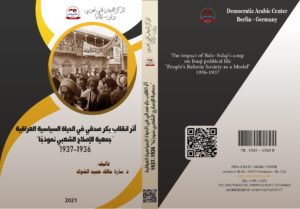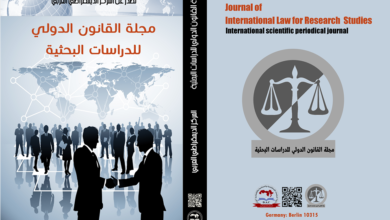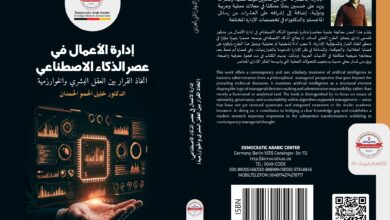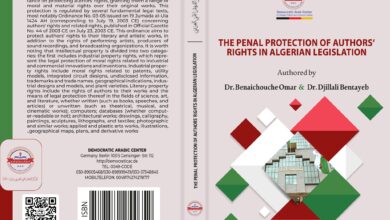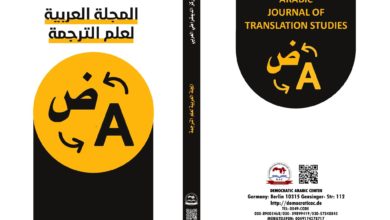أثر انقلاب بكر صدقي في الحياة السياسية العراقية “جمعية الإصلاح الشعبي نموذجًا” 1936-1937
The impact of Bakr Sidqi's coup on Iraqi political life "People's Reform Society as a Model" 1936-1937
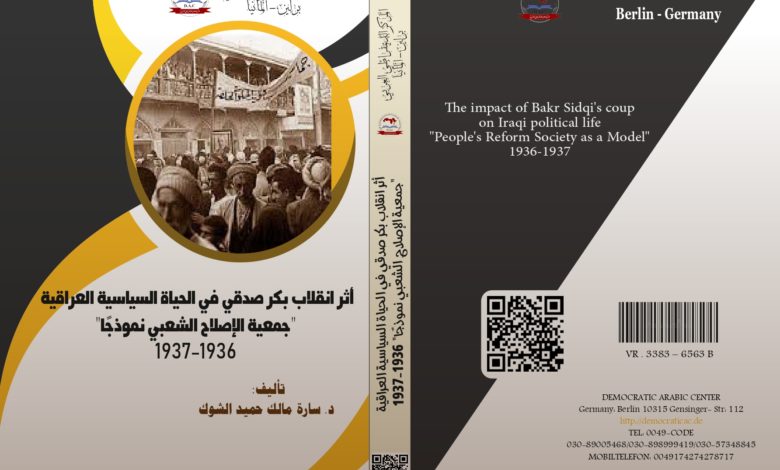
تأليف : م.د. سارة مالك حميد الشوك
نسخة “pdf”-
أثر انقلاب بكر صدقي في الحياة السياسية العراقية جمعية الإصلاح الشعبي نموذجًا 1936-1937
الطبعة الأولى “2021″ –من كتاب: –
أثر انقلاب بكر صدقي في الحياة السياسية العراقية “جمعية الإصلاح الشعبي نموذجًا” 1936-1937
جميع حقوق الطبع محفوظة #المركز_الديمقراطي_العربي ولا يسمح بإعادة إصدار هذا الكتاب أو اي جزء منه أو تخزينه في نطاق إستعادة المعلومات أو نقله بأي شكل من الأشكال، دون إذن مسبق خطي من الناشر .
تقديم:
شهد تأريخ العراق المعاصر أحداثاً سياسية وإقتصادية واجتماعية مهمة، كان للأحزاب والجمعيات السياسية دور في الكثير من مجرياتها. لتنطلق دراسة تلك الأحزاب والجمعيات من مسّوِغ معرفة مدى تأثيرها في تلك الأحداث من جهة، ومدى تأثّرها بها من جهة أخرى. وقد عبّرتْ الدراسات المنجزة في هذا السياق عن شغف أكاديمي لدى الباحثين والمؤرخين العراقيين الذين أنجزوا عدداً من الرسائل والأطاريح الجامعية التي بحثت في تاريخ الأحزاب السياسية، ناهيك عما يعنيه هنا مغزى تقصي انخراط النخبة السياسية العراقية في العمل الحزبي مع انبثاق الحياة الحزبية المنظمة في العراق بصدور قانون الجمعيات في الثاني من تموز 1922.
من هذا المنطلق، يبدو مفهوماً ومسوغاً إن تكون(جمعية الإصلاح الشعبي) موضوع هذه الدراسة، لاسيما أنها تأليفها جاء عقب أول انقلاب عسكري في تأريخ العراق المُعاصر، فضلاً عن أنها لم تُبْحَثْ بصورة تفصيلية في رسالة أو أطروحة جامعية مستقلة، إذ أدى أعضاء تلك الجمعية المنبثقون أصلاً من جماعة الأهالي، دوراً فاعلاً في الحياة السياسية العراقية سواء كانوا في الكابينة الوزارية أو في مجلس النواب العراقي، بالرغم من المدة القصيرة التي مارسوا نشاطهم فيها، فقد شملت تلك المدة على الكثير من التطورات المهمة، لاسيما إن جمعية الإصلاح الشعبي جاءت عقب أول انقلاب عسكري في تأريخ العراق المعاصر، وما رافق ذلك من أحداث على مجالات الحياة كافة.
حُدّدِتْ مدّةُ الدراسة ما بين تشرين الثاني 1936، تأريخ تأسيس الجمعية حتى الرابع عشر من تموز 1937، تأريخ إغلاقها. قُسّمتْ الدراسة إلى مقدمة وأربعة فصول وخاتمة وملاحق. جاء في الفصل الأول أثر انقلاب بكر صدقي في تأسيس جمعية الإصلاح الشعبي، وموقفها من انتخابات المجلس النيابي لعام 1937، في حين تطرق الفصل الثاني إلى نشاط أعضاء جمعية الإصلاح الشعبي في متابعة الأوضاع الاجتماعية والإقتصادية ومراقبة النظام السياسي ومكافحة الفساد في الجهاز الإداري، داخل المجلس النيابي.
تناول الفصل الثالث تكتل خصوم جمعية الإصلاح الشعبي داخل المجلس النيابي، فضلاً عن دراسة سبب استقالة وزراء جمعية الإصلاح الشعبي وأثره في حلّ الجمعية.
تطرق الفصل الرابع إلى اتهام جمعية الإصلاح الشعبي بدعم الحركة الصهيونية، إذ جاء في المحور الأول مقالاً لعبد الجبار العمر بعنوان حزب الإصلاح الشعبي(جماعة الأهالي) والصهيونية، المنشور في مجلة آفاق عربية في أيلول 1980، أتهم فيه الجمعية بدعم النشاط الصهيوني، في حين جاء في المحور الثاني تعقيب كل من حسين جميل وصادق كمونة على ما جاء في ذلك المقال المنشور في المجلة ذاتها في كانون الثاني 1982. وتركنا المقال والردود كما جاءت، مع الإشارة إلى بعض التعاريف والتوضيحات والتعليقات الضرورية فقط. وقد شملت الخاتمة على أهم الاستنتاجات التي توصل أليها الباحث على وفق اجتهاده وعلى وفق منهج البحث التأريخي التحليلي.
اعتمدت الدراسة على العديد من المصادر المهمة في مقدمتها الوثائق غير المنشورة المحفوظة في دار الكتب والوثائق العراقية، ومنها ملفات وزارة الداخلية، فضلاً عن الوثائق البريطانية. أما الوثائق المنشورة فقد كانت محاضر مجلس النواب للاجتماع غير الاعتيادي لعام 1937 التي قدمت معلومات غزيرة ومفيدة وكانت المادة الأساس للفصول الثالث والرابع والخامس. في حين ألفت الرسائل والأطاريح الجامعية المنشورة منها وغير المنشورة مصدراً مهماً آخر يصعب الاستغناء عنه.
Abstract
The contemporary history of Iraq witnessed important political, economic and social events. Political parties and associations had a role in many of its events. In order to study these parties and associations, the justification for knowing the extent of their influence on these events on the one hand, and the extent to which they are affected by them on the other hand, is justified. The studies carried out in this context have expressed an academic passion among Iraqi researchers and historians who have completed a number of theses and university theses that examined the history of political parties, not to mention what it means here to investigate the significance of the Iraqi political elite’s involvement in partisan work with the emergence of organized partisan life in Iraq with the issuance of a law Associations on the second of July 1922.
From this point of view, it seems understandable and justified that the Popular Reform Society is the subject of this study, especially since its authorship came after the first military coup in the contemporary history of Iraq, not to mention that it was not discussed in detail in an independent university thesis or thesis, as members of that association Those who originally emerged from the Al-Ahali group, played an active role in Iraqi political life, whether they were in the cabinet or in the Iraqi parliament, despite the short period in which they practiced their activities. That period included many important developments, especially that the Popular Reform Society came after the first A military coup in the contemporary history of Iraq, and the accompanying events in all areas of life.
The duration of the study was set between November 1936, the date of the association’s founding, until the fourteenth of July 1937, the date of its closure. The study is divided into an introduction, four chapters, a conclusion and appendices. In the first chapter, the impact of Bakr Sidqi’s coup in establishing the People’s Reform Association, and its position on the Parliament elections of 1937, while the second chapter touched on the activities of the members of the Popular Reform Association in following up on social and economic conditions, monitoring the political system and fighting corruption in the administrative apparatus, within the Parliament. The third chapter dealt with the bloc’s opponents of the Popular Reform Society within the Parliament, as well as studying the reason for the resignation of the Ministers of the Popular Reform Society and its impact on the dissolution of the Assembly.
The fourth chapter dealt with the accusation of the Popular Reform Society of supporting the Zionist movement. In the first axis, an article by Abdul-Jabbar al-Omar came under the title of the Popular Reform Party (The People’s Group) and Zionism, published in the Arab Horizons magazine in September 1980, accusing the Society of supporting Zionist activity, while it came In the second axis, Hussein Jamil and Sadeq Kammuna commented on what was stated in that article published in the same magazine in January 1982. We left the article and the responses as they came, with reference to only some necessary definitions, clarifications and comments. The conclusion included the most important conclusions reached by the researcher according to his diligence and according to the historical analytical research method.
- الناشر: المركز الديمقراطي العربي للدراسات الإستراتيجية والسياسية والاقتصادية

